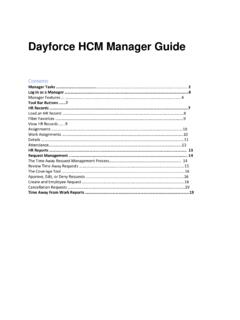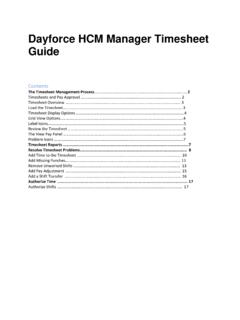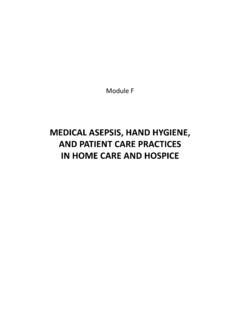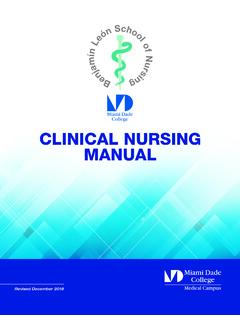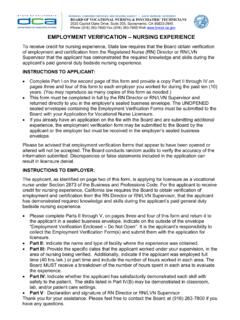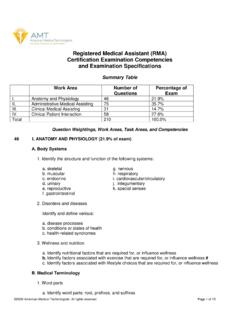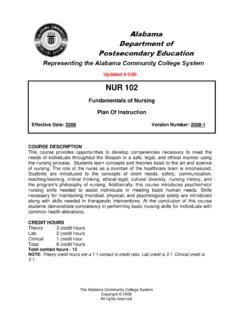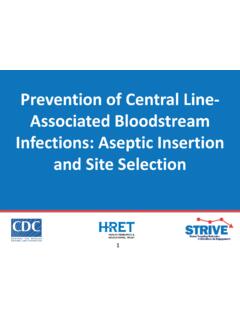Transcription of Medication Administration Course - Imagine!
1 Medication Administration Course HOW TO USE THIS MANUAL. Notes to the instructor have been incorporated into instructor's note pages that follow the chapter format of the manual and are located at the end of the section. Testing forms are provided for the practicum as well as the written test. There are two versions of the written test with corresponding answer sheets and answer keys. Medication Administration Course BACKGROUND. Innovations Nursing & Residential Medication Administration Course is designed to accurately administer medications to individuals in DIDD/CDPHE Services approved programs: Group Residential Services and Supports (GRSS), Individual Residential Services and Supports (IRSS), Day Habilitation Services and Supports (DHSS), State certified adult day programs, Adult Supported Living Services (SLS), Children's Extensive Services (CES).
2 Residential Child Care Facilities Assisted living residences and Alternative care facilities. Any paid staff or provider who administers medications must complete this Course and pass the competency evaluation that has been approved. This Medication Administration Course will prepare participants for this testing. The Course also allows each agency to add agency specific materials and procedures to the information provided. If you work for a different agency, some materials may not apply to you. The material also includes a chapter on Medication Administration from Medication Reminder Boxes.' This chapter will be taught as part of the initial Medication Administration Course . The training for paid staff or providers that will be filling Medication reminder boxes is a separate packet and may only be taught to staff or providers that have passed the Medication Administration Course .
3 INSTRUCTOR REQUIREMENTS. To teach this Course , the instructor must: Be a Licensed Nurse ( RN or LPN), Licensed Pharmacist, Physician or Physician Assistant Be familiar with DIDD and CDPHE rules and regulations Be familiar with agency specific policies and procedures related to Medication Administration Be knowledgeable of and utilize the Course materials Participate in the written and practical testing of each participant The approved training entity (ATE) shall retain student competency evaluation records for a minimum of three years. At the completion of the Course the instructor must: Provide passing participants with a document of completion. To pass the Course each participant must score a minimum of 80% for the Medication Administration Course Written test, 100% on the Medication Administration practicum.
4 Provide the agency with a document of completion stating the participant has completed and passed the Course . Provide the CDPHE with a legible list of participants who have passed the Course (s) preferably via email. Please use only the format included at the end of the instructor manual. 1. Course MATERIALS. Medication Administration Course materials include the following: Instructor's Manual, which includes: o Testing materials o Participant completion forms o Forms required by CDPHE for submitting names of participants who have passed the Course . o Reference materials Student Manual, which includes: o Reading materials o Review questions Course materials to be provided by each agency/nurse include: o Copies of the student manual for each participant o Agency specific forms o Agency specific policies and procedures o Practicum materials RECOMMENDED CLASS STRUCTURE.
5 It is recommended that at a minimum the following structure be followed when teaching this Course to first time participants. The average amount of time is listed in parenthesis. The classroom instruction time is to be based on the number of participants and the learning styles of participants, instructors may use their discretion in regard to time frames and what portions of the Course may be required for those individuals who are not first time participants or who are retaking the Course for whatever reason ( agency training requirements, individual actions, etc.). Classroom instruction to review Course manual and agency specific material with qualified instructor. (5) Hours Practicum and written testing with qualified instructor.
6 (2-3 hours). Copies of written tests must be collected by instructor and NOT given out to students as study guides. 2. Introduction Course Objectives To accurately administer medications to individuals in DIDD/CDPHE Services approved programs: Group Residential Services and Supports (GRSS), Individual Residential Services and Supports (IRSS), Day Habilitation Services and Supports (DHSS), State certified adult day programs, Adult Supported Living Services (SLS), Children's Extensive Services (CES). Residential Child Care Facilities, Assisted living residences, and Alternative care facilities. To safely administer medications according to written physician or other authorized practitioner orders. To maintain proper documentation of the Administration of both prescription and non-prescription medications.
7 To use the proper techniques when administering medications by the various routes -ingestion, application, inhalation, insertion. To comprehend and be able to demonstrate the following: Important guidelines of Medication Administration Use and forms of drugs Medication orders Documentation including controlled Medication documentation and count Seven Rights of Medication Administration Medication Administration Procedures Medication errors Medication storage Rules and regulations related to psychotropic medications Medication reminder box (MRB) guidelines The minimum passing score of this Course written test is 80% to be considered as a Qualified Medication Administration Person (QMAP). Cautions: This Course does NOT lead to certification or licensure to administer medications.
8 QMAPs are NOT trained or authorized to make any medical or psychological judgement, assessment, or evaluation of the individual being assisted. QMAPs may ONLY administer medications according to the written physician or other authorized practitioner order by the following routes: Oral Sublingual Topical Eye drops or ointment Ear drops Nasal Transdermal Inhaled Rectal and vaginal QMAPs MAY NOT take phone orders for any medications including changes or discontinuation. 3. FOR THIS Course Medication Administration IS: As defined by law: Assisting an individual in the ingestion, application, inhalation, or using universal precautions, rectal or vaginal insertion of Medication including prescription and non-prescription drugs according to the written or printed directions of a licensed physician or other authorized practitioner and making a written record thereof with regard to each Medication administered, including the time and amount taken.
9 ' [ (1) ]. Accurately and safely administering medications from Medication reminder boxes (MRB) with oversight from a licensed individual (nurse or pharmacist) or Qualified Manager. Filling of Medication Reminder Boxes with oversight by a Qualified Manager or Licensed individual (nurse or pharmacist). REQUIRES SEPARATE AND SPECIALIZED TRAINING. Administering medications through a Gastrostomy Tube EXTRA TRAINING AND. OBSERVATIONS ARE REQUIRED IN ORDER TO ADMINISTER ANYTHING THROUGH A. G-TUBE (MUST ALSO MEET REQUIREMENTS FOR GASTROSTOMY SERVICES PRIOR TO. ADMINISTERING ANY Medication , NUTRIENT OR LIQUID THROUGH A GASTROSTOMY. TUBE!). SCOPE OF PRACTICE: The qualified Medication Administration Person (QMAP) is an individual who has successfully completed the Medication Administration Course provided by Innovations Nursing & Residential Services approved training entity.
10 A QMAP is permitted to administer medications via oral, sublingual, ear, eye, topical, nasal, inhalant, rectal and vaginal routes. Gastrostomy tube Medication Administration may be done ONLY after additional approved training and under supervision of licensed nurse. A QMAP is permitted to administer medications in the following authorized settings; assisted living residences, adult foster care facilities, alternative care facilities, residential care facilities, secure residential treatment centers, state certified adult day programs and program approved service agencies for people with intellectual and developmental disabilities. As a QMAP and individual providing support to vulnerable adults, you are required to (to the best of your ability) report any suspicions regarding abuse, neglect or misappropriate of an individual's property.
